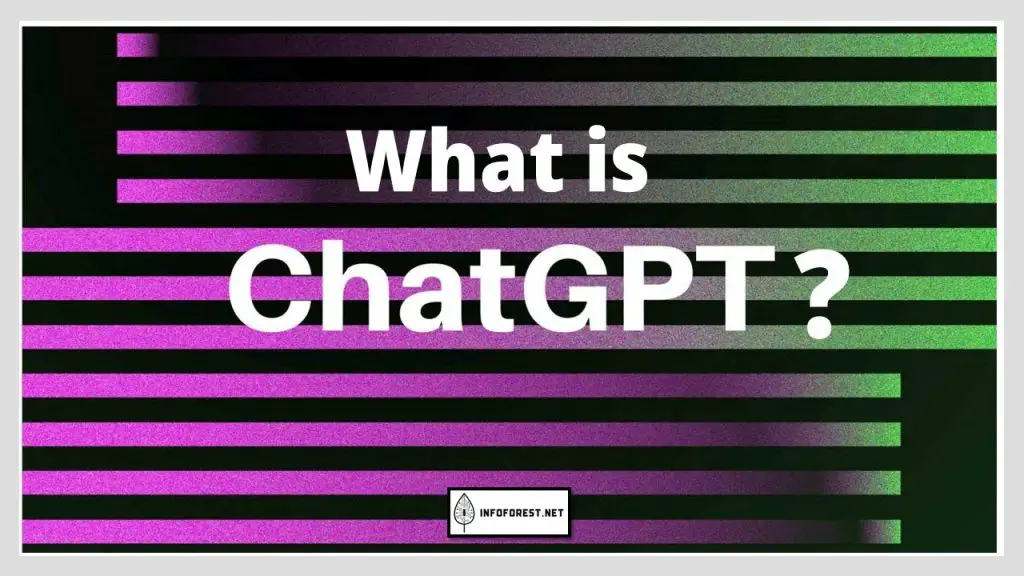
ChatGPT is an AI-powered language model developed by OpenAI. It is capable of generating human-like text based on the input it receives. ChatGPT has been trained on a large corpus of text data and can answer questions, provide information, and engage in conversation on a wide range of topics. Its aim is to provide users with relevant and accurate information in a conversational format.
What is ChatGPT?
ChatGPT is a pre-trained language model based on the GPT (Generative Pretrained Transformer) architecture developed by OpenAI. It is a deep learning-based model that has been trained on a massive corpus of text data from the internet, including websites, books, and social media, to generate human-like text.
The goal of ChatGPT is to make it easy for developers to build conversational AI systems. It can answer questions, generate responses to prompts, provide information on a wide range of topics, and engage in conversation.
ChatGPT is trained using unsupervised learning, which means that it was trained on a large dataset without explicit labels or annotations. The model learns patterns in the data and uses that knowledge to generate new text that is similar in meaning and style to the input it received.
ChatGPT has proven to be a highly versatile and capable language model, and it has a wide range of applications, including chatbots, customer service automation, language translation, and more. Its human-like text generation capabilities make it an attractive tool for developers looking to build conversational AI systems that can engage with users in a natural and intuitive way.
Ownership
OpenAI is the owner of ChatGPT. OpenAI is a research organization focused on developing and promoting friendly AI that benefits humanity. The organization was founded in 2015 by Elon Musk, Sam Altman, Greg Brockman, Ilya Sutskever, John Schulman, and Wojciech Zaremba. It aims to advance artificial intelligence in a responsible and safe manner to benefit humanity. OpenAI is best known for its work in developing state-of-the-art language models such as GPT-3, which is the basis for ChatGPT.
How ChatGPT makes money
OpenAI makes money through a variety of means, including licensing its technology and offering cloud-based AI services to businesses and organizations. For example, OpenAI offers an API that allows developers to access and use the capabilities of its language models, including ChatGPT, in their own applications. This API is available through a subscription-based model, where customers pay a fee to access the API and use its capabilities.
Additionally, OpenAI also provides AI consulting services and partners with organizations to integrate its technology into their products and systems. OpenAI also earns revenue through research grants, partnerships, and investments.
In summary, OpenAI monetizes ChatGPT and its other AI technologies through a combination of licensing, cloud services, consulting, and partnerships. The exact details of its business model may change over time, as the company continues to evolve and explore new opportunities in the AI space.
Competitors of ChatGPT
There are several companies and organizations that compete with OpenAI and its ChatGPT language model. Some of the key competitors include:
- Google: Google has a strong presence in the AI and language processing space, with several language models of its own, including BERT and GPT-2.
- Microsoft: Microsoft also has a strong portfolio of AI technologies, including the Microsoft Cognitive Services suite, which includes a language processing API.
- Amazon: Amazon offers a cloud-based AI platform called Amazon Web Services (AWS), which includes a number of AI and machine learning services, including natural language processing.
- IBM: IBM is a major player in the AI space, with its Watson platform offering a range of AI services, including natural language processing and machine learning.
- Facebook: Facebook has developed its own AI research team and has several language models of its own, including RoBERTa.
These are just a few of the companies that compete with OpenAI and its ChatGPT language model. The AI and language processing space is rapidly evolving, and new competitors are emerging all the time. OpenAI remains at the forefront of the field, and it continues to develop new and innovative AI technologies that set the standard for the industry.

What languages does ChatGPT support?
ChatGPT, being a language model developed by OpenAI, supports several languages, including:
- English
- Spanish
- French
- German
- Italian
- Portuguese
- Dutch
- Russian
- Chinese (Simplified)
OpenAI continues to develop and improve its language models, and it is likely that the number of supported languages will increase over time. The language models are trained on a large corpus of text data from a variety of sources, including websites, books, and social media, to generate human-like text in the target language. The accuracy of the model may vary depending on the language and the quality of the training data, but OpenAI is constantly working to improve its language models to provide the best possible experience for its users.
Who should not use ChatGPT?
ChatGPT, like any AI-powered language model, has limitations and should not be used in certain circumstances. Here are some of the scenarios where ChatGPT should not be used:
- High-stakes decision-making: ChatGPT, like any AI model, is not perfect and can make mistakes. It should not be relied upon for high-stakes decision-making where errors could have serious consequences.
- Sensitive or confidential information: ChatGPT is a large language model that has been trained on a vast amount of text data from the internet. It may not be suitable for handling sensitive or confidential information as there is a risk that the information could be disclosed or misused.
- Legal or financial advice: ChatGPT is not a substitute for legal or financial advice. It may provide general information on these topics, but it should not be relied upon for specific advice in these areas.
- Medical diagnosis or treatment: ChatGPT is not trained or equipped to provide medical diagnosis or treatment. It should not be used as a substitute for professional medical advice.
In summary, ChatGPT should be used with caution and only for appropriate applications. It is not a substitute for professional judgment or advice in sensitive or critical situations.
What questions can’t ChatGPT answer?
ChatGPT, like any AI language model, has limitations and cannot answer all questions. Here are some types of questions that ChatGPT may not be able to answer accurately:
- Questions that require subjective or personal opinion: ChatGPT is trained on text data and can provide general information based on that data, but it cannot provide a personal opinion or subjective judgment.
- Questions that require access to restricted or confidential information: ChatGPT is trained on text data from the internet, but it may not have access to restricted or confidential information that is not publicly available.
- Questions that require real-time data or updates: ChatGPT is trained on text data from a fixed period and may not have access to real-time information or updates.
- Questions that are too complex or beyond its capabilities: ChatGPT is a powerful language model, but it may not be able to answer questions that are too complex or beyond its current capabilities.
- Questions that involve ethical or moral considerations: ChatGPT is a machine-learning model and does not have the ability to make ethical or moral judgments.
In summary, ChatGPT can provide accurate and helpful information on a wide range of topics, but it is important to understand its limitations and to not rely on it for critical or high-stakes decisions.
How many monthly visitors does chat have?
As a language model developed by OpenAI, ChatGPT does not have a standalone website with its own monthly visitors. Instead, it is integrated into various applications and services, such as chatbots, content generation tools, and more. As a result, it is not possible to determine the exact number of monthly visitors for ChatGPT. The use of ChatGPT is likely widespread, given its powerful language generation capabilities and the growing demand for AI and natural language processing technologies. However, without specific data on its use in individual applications, it is not possible to determine the number of monthly visitors for ChatGPT.
What are the 5-year goals of Chat GPT?
Some potential goals for ChatGPT could include:
- Improving the accuracy and effectiveness of the model: OpenAI will likely aim to continue improving the accuracy and effectiveness of ChatGPT through ongoing training and development.
- Expanding the use of ChatGPT in various applications: OpenAI may aim to expand the use of ChatGPT in a wider range of applications, including chatbots, content generation, and more.
- Increasing the efficiency and scalability of the model: OpenAI may aim to make ChatGPT more efficient and scalable so that it can be used in larger and more complex applications.
- Developing new language models and capabilities: OpenAI may aim to develop new language models and capabilities that build upon the success of ChatGPT, such as multi-language models or models with improved reasoning capabilities.
- Advancing the field of AI and natural language processing: OpenAI may aim to continue advancing the field of AI and natural language processing through its work with ChatGPT and other language models, and by partnering with other organizations and institutions.
These are just a few examples of potential goals for ChatGPT, and OpenAI may have different or additional goals that are not publicly disclosed.
Most Viewed Articles
Conclusion
In conclusion, ChatGPT is a powerful language model developed by OpenAI that is capable of generating human-like text based on a prompt. It has been trained on a vast amount of text data from the internet, making it a valuable tool for a range of applications, including language translation, content generation, and customer service. However, it is important to remember that ChatGPT, like any AI model, has limitations and should be used with caution. It should not be relied upon for high-stakes decision-making, handling sensitive or confidential information, providing legal or financial advice, or making medical diagnoses or treatments. OpenAI continues to develop and improve its language models, and it is likely that ChatGPT will continue to evolve and play an increasingly important role in the field of AI and language processing.
We also invite you not to miss our other popular articles such as:
Difference Between Derivative and Antiderivative–Difference between left and right Twix–Difference Between Eastern Time Zone and Central Time Zone–Difference Between Capitalism and Communism– Difference Between EST and EDT–How many weeks in a Year– Difference Between Evening and Afternoon – Democrat vs Republican – Kilometer vs Mile – How to get rid of hiccups What does TBH mean – What does NSFW mean – What does IG mean–What does CAP mean– What is normal blood pressure –What is the rarest blood type–Difference Between Hotel And Motel – Differences Between Chinese and Japanese and Difference Between Zip Code and Postal Code–






